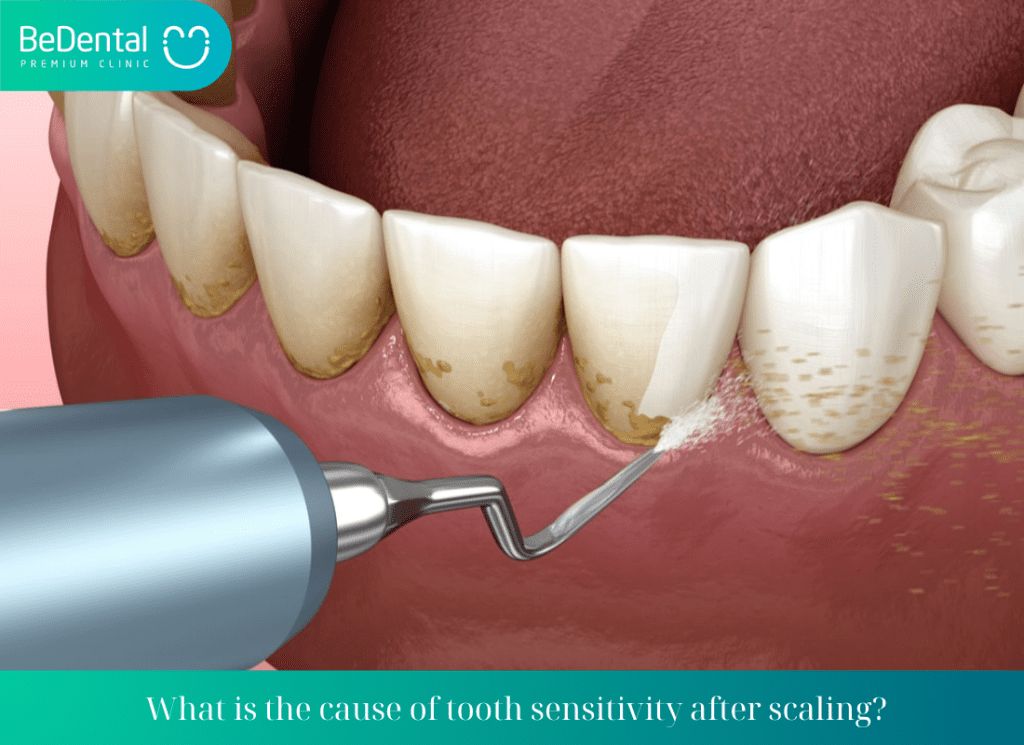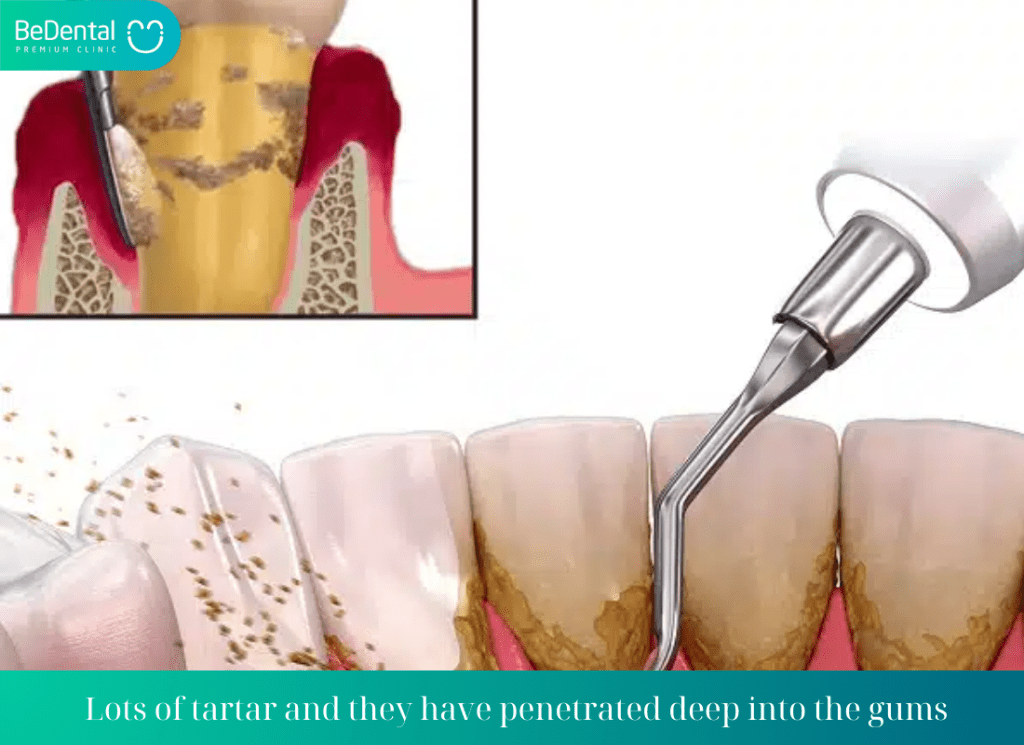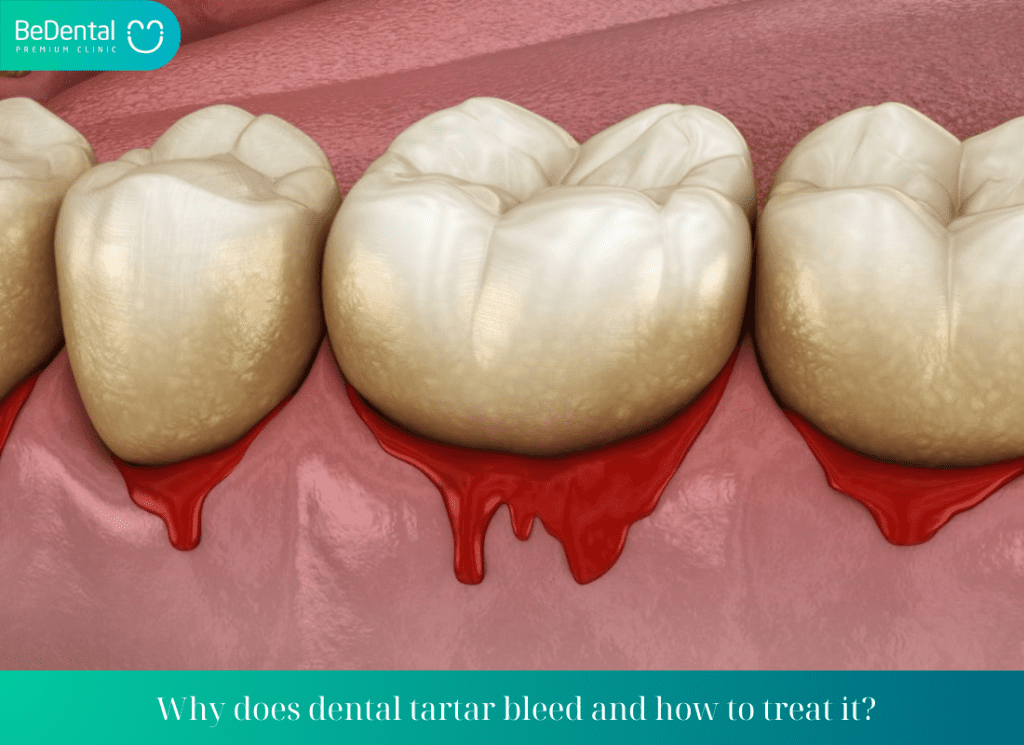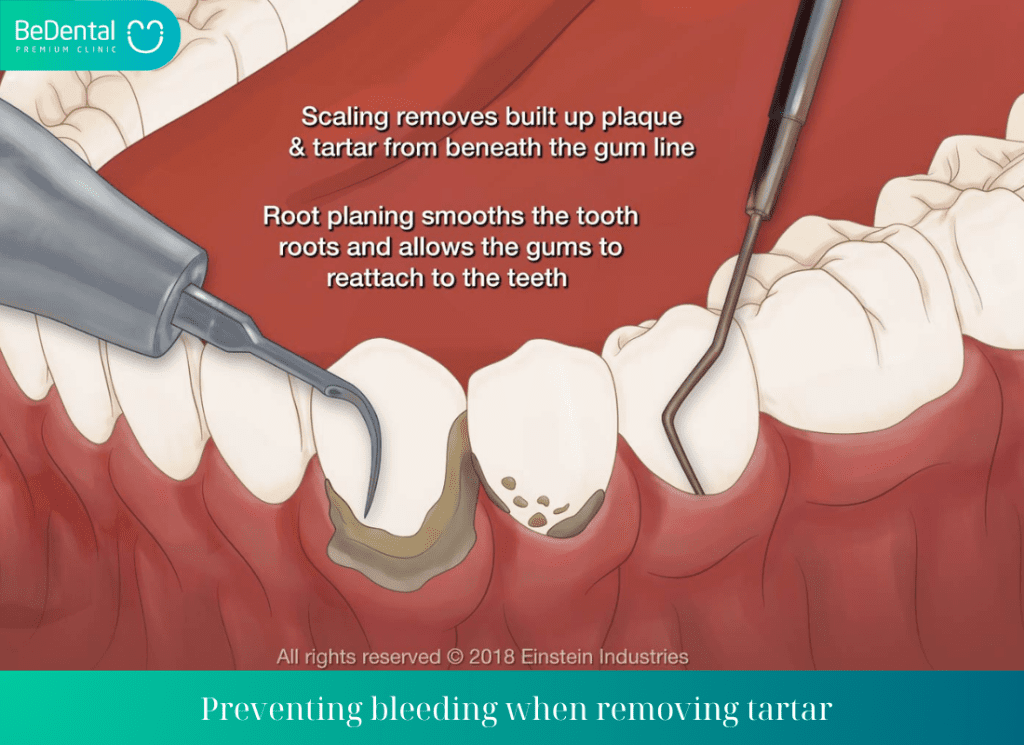WHAT ARE THE CAUSES OF TEETH SENSITIVITY AFTER SCALING? The longer tartar is left, the more difficult it will be to remove and will easily create conditions for bacteria to hide in the gums and tooth roots, causing dental diseases. Therefore, doctors often recommend periodic removal of tartar to eliminate maximum bacterial hiding places and help keep teeth cleaner.
However, there are still many questions of concern about cases of teeth sensitivity after scaling, bleeding and receding gums after tooth scaling. This is also what makes many people hesitant about removing tartar. So what is the cause and how to handle teeth sensitivity after scaling? Let’s find out with BeDental!
What is the cause of teeth sensitivity after scaling?
What is the cause of teeth sensitivity after scaling? After scaling, patients often feel sensitivity in their teeth. Making the eating process during this time uncomfortable and uncomfortable.
This is also a common thing for those who have just had their teeth removed. However, not everyone knows what is the cause of teeth sensitivity after scaling as well as how to overcome this situation.

See more: How long does dental filling last? Important considerations after dental filling
The reason why you experience Teeth Sensitivity after Scaling
There are many reasons why we often experience teeth sensitivity after scaling:
Lots of tartar and they have penetrated deep into the gums
Tartar is very easy to form and it accumulates daily and hourly on our teeth. Over time, they will become hard plaque on our teeth without us even knowing.
In particular, these tartar cannot be removed just by brushing your teeth every day, but you must use specialized machines to remove them thoroughly.
If we do not remove tartar regularly, the tartar will increase and spread to the gums. Now when performing tartar removal, the doctor must impact the gum area to remove them. Because gums are a soft and quite sensitive tissue of the oral cavity. So after removing tartar, we often feel pain and discomfort,which can contribute to teeth sensitivity after scaling
Besides, because tartar plaque is thick and penetrates deep into the gums, after removing tartar, gaps will appear, especially in the gum area.These gaps can be a major factor in teeth sensitivity after scaling.
However, after a while the gums will gradually close. Therefore, the more tartar encroaches on the gums, the larger the gap between the teeth and gums will appear after removing the tartar, potentially leading to increased teeth sensitivity after scaling

Teeth sensitivity after scaling may be due to dental disease
In many cases, you already have previous dental diseases such as gingivitis, periodontitis, etc. Dental diseases also affect the process of tartar removal. Usually after tartar removal, you will bleed, which can worsen teeth sensitivity after scaling.This can result in heightened teeth sensitivity after scaling
Therefore, you will often feel prolonged sensitivity and pain. In many cases, the condition can last until you recover from the dental disease, even after the initial teeth sensitivity after scaling subsides.
The tooth base is already weak or the tooth enamel is worn away
Weak tooth enamel can be hereditary. In addition, the effects of improper chewing or age problems also weaken tooth enamel. Weak enamel also makes teeth more sensitive.
Especially after tartar removal, people with weak tooth enamel will often feel much more sensitive and painful than normal people. Sensitivity can last for a few hours or a few days depending on the case.This prolongedteeth sensitivity after scaling can be quite bothersome
Uncertainty in tooth scaling technique
Today, with modern technology, dentists often use tooth scaling technology using an ultrasonic machine. Helps separate tartar plaques easily and flexibly at tooth positions. By applying a light and moderate force to the plaque on the tooth crown, it causes them to peel off and easily disintegrate.
However, this is not a technique that all doctors perform well. Because they need to make sure to choose the most appropriate hand force to remove tartar for the patient without affecting the soft tissues as well as the teeth. At the same time, removing tartar with a machine also affects certain nerves.
Therefore, if dental plaque is removed at unreliable, poor quality dental clinics, unskilled doctors, or unreliable equipment, it can also cause tooth sensitivity and pain.
See more: 5 causes of porcelain tooth sensitivity?
How to overcome sensitivity after tartar removal
How to overcome sensitivity after tartar removal? After removing tartar, we will often feel sensitivity and discomfort, so here is how to overcome sensitivity after removing tartar:
Apply heat
Applying heat will help blood vessels dilate and increase blood circulation and limit nerve stimulation. Therefore, applying this method will help reduce sensitivity and pain quickly.
We can do this method by using a warm towel (soaked in hot water) to apply to the painful tooth area. Note that you should avoid using a towel that is too hot as it can cause burns and more serious conditions. You should test the temperature of the towel before using this method!
Apply ginger

Ginger contains many vitamins that are good for your health, such as vitamin A, vitamin C, vitamin E, zinc, calcium, and potassium. Besides, ginger also has warming properties that effectively reduce pain and sensitivity. You can use ginger to reduce tooth sensitivity by crushing a small piece of ginger and applying it to the sensitive tooth area and keeping it for about 20 minutes.
Green tea
Green tea is one of the ingredients used in toothpaste, because it contains fluoride to help reduce dental sensitivity and many ingredients that are good for teeth, supporting protein enamel to protect teeth. When you feel pain, you can chew a few green tea leaves for about 5 minutes. Then, rinse your mouth with clean water.
Rinse with salt water
Use 5 tablespoons of salt mixed with 1 liter of filtered water then boil for 10 minutes. Let it warm and you can use that salt water to rinse your mouth, the rest you can store and use later. Rinsing with salt water will help you reduce sensitivity after tartar removal, while also removing bacteria on your teeth.
How to prevent and strengthen teeth to avoid sensitivity when removing tartar
To prevent and limit sensitivity after tooth scaling, we should do the following:
- Avoid eating and drinking foods that are too hot, too cold, carbonated drinks, or foods that are high in fat, sugar, or foods that are too hard to avoid wearing down and weakening tooth enamel.
- Practice regular oral hygiene, use dental floss to remove food particles from your teeth, and brush your teeth properly with habits such as using a soft-bristled toothbrush and brushing gently and thoroughly.
- Drinking carbonated water also causes yellow teeth, similar to other foods such as chocolate, coffee, tea, curry, cigarettes, etc., which are colored foods that cause yellow teeth and tooth stains. again faster. Therefore, to protect teeth from sensitivity before or after scaling, you should avoid using these foods.
- Use saline water to rinse your mouth, this helps kill bacteria and remove plaque.
See more: What should I eat after wisdom tooth extraction? What to abstain from?
Tartar is the home of bacteria that are harmful to the teeth, especially these bacteria, left for a long time, can destroy bone and gum tissue, causing the gums to atrophy and shrink, exposing tooth roots, causing gum recession.
Therefore, you should use toothpaste containing HAP to make your gums healthier, help reduce sensitivity when removing tartar, prevent gum recession as well as protect your gums before tartar is removed. cancel.
You should use services at dental clinics that are guaranteed and reputable in the market, using modern machines and techniques and highly qualified and experienced doctors.
This will help minimize complications and problems after tartar removal. Therefore, do not hesitate to go to good, reputable dentists to remove tartar to best protect your teeth.
Regularly remove tartar (usually every 3-6 months) to limit tartar plaques from spreading and encroaching too much on the gums.
Do not brush your teeth immediately after eating as this will damage tooth enamel. And you should only do this at least 30 minutes after eating.
Why does dental tartar bleed and how to treat it?
Why does dental tartar bleed and how to treat it? One of the problems that occurs after tartar removal is bleeding. So what causes this situation and how to fix it?

Causes of bleeding when scaling teeth
- Due to the characteristics and condition of tartar:
When tartar is large and covers the crown of the tooth, encroaching on the gum area, during the process of removing tartar, the doctor will more or less impact the gum area, causing this soft tissue to bleed slightly. In addition, if tartar sticks tightly to the gums, the gums will bleed when scraping.
Therefore, the more tartar plaques adhere to the gums, the higher the level of damage, causing the bleeding to flow more continuously. In this situation, the doctor will have a reasonable solution and immediately stop the bleeding after removing the tartar.
- Because the body has underlying diseases:
When tartar plaques spread to the gums and the patient has some underlying diseases, especially hemophilia, it will cause continuous bleeding after tartar removal. Therefore, if your body has other pre-existing medical conditions, talk to your doctor immediately before performing any dental service!
- Due to the doctor’s skills:
Is the tooth scaling service at dental clinics good? Whether or not problems that cause more sensitivity or bleeding can be limited depends greatly on the skill of the doctor. Removing tartar will have more or less impact on soft tissue and gums.
See more: Dental bridges and 4 types
Therefore, if the doctors are not proficient in their hands, as well as lack expertise and experience in removing dental plaque, it will cause pain and discomfort for the patient during the procedure, which is especially more dangerous. This can cause continued bleeding long after the procedure is completed.
How to fix bleeding when removing tartar
How to fix bleeding when removing tartar: In case of bleeding or bleeding when removing tartar, we can temporarily treat it by rinsing the mouth with physiological saline. At the same time, use medical cotton to stop bleeding by biting the cotton on the bleeding site.
If the gums bleed after root extraction and in addition, the patient has other diseases such as gingivitis and periodontitis, they need to be treated by using some antibiotics and taking medication as prescribed by the dentist. doctor.
Bleeding after tooth scaling will last a short time, however if the bleeding is continuous, prolonged and unusual complications appear, we need to contact the doctor immediately for timely treatment. time to avoid the situation becoming more serious.
Preventing bleeding when removing tartar

How to fix bleeding when removing tartar: Removing tartar depends a lot on the skill and techniques of the doctor. Therefore, it is the best way to prevent bleeding from tooth root extraction as well as the occurrence of unwanted conditions.
We should choose good, reputable dentists on the market. Besides, considering a good, quality dentistry on the market needs to ensure the following factors:
- Good specialized doctors with a lot of experience in the profession: A doctor with a lot of experience and expertise will be able to measure risks in advance and have a lot of experience from previous cases from which he will have appropriate solutions. project to prevent risks.
- At the same time, through many patients, doctors will have the techniques to safely and securely remove tartar and perform the process more accurately to limit pain and discomfort. excessive bleeding.
- Modern tartar removal technology: Today, with modern technology and techniques, most dentists use ultrasound waves to remove tartar. This is also the top choice of customers, because this technology helps remove tartar easily and quickly.
- Minimize the impact on teeth and gums, thereby helping to limit bleeding gums.
Above, BeDental has shared with you the causes, treatments as well as how to prevent sensitivity, bleeding, and gum recession after removing tartar. Hopefully the above article has brought you a lot of information about tartar removal and helped you overcome possible situations in the best way.
If you need to remove dental plaque, please contact BeDental for advice!
Reference price list:
List Time Unit Price
Dental Check up 250.000
~ 10$
Tartar Cleaning and polishing (More detail...)
Tartar Cleaning and polishing - mild ~15 mins 2 jaws 350.000
~ 14$
Tartar Cleaning and polishing - moderate ~20 mins 2 jaws 450.000
~ 18$
Tartar Cleaning and polishing - heavy ~30 mins 2 jaws 600.000
~ 24$
Other dental Service
Cleaning with Cacbonat sand 15 mins 2 jaws 1.000.000
~ 39$
Operculectomy - Gumgivitis (Tìm hiểu thêm...)
30 mins 2 jaws 2.000.000
~ 75$
Tư vấn chuyên môn bài viết:
BÁC SĨ DƯƠNG THỊ THÙY NGA
Bác sĩ chỉnh nha tổng hợp
Ngôn ngữ giao tiếp: Tiếng Việt, Tiếng Anh, Tiếng Nga
Đặt Lịch Hẹn
Xem Hồ Sơ
Tư vấn chuyên môn bài viết:
BÁC SĨ DƯƠNG THỊ THÙY NGA
BEDENTAL - TOP STANDARD DENTISTRY SYSTEM
In HANOI
Address 1: 7B Thi Sach St, Ngo Thi Nham, Hai Ba Trung Dist, Ha Noi. - 0934.61.9090
Address 2: No 129 Hoang Ngan, Yen Hoa, Cau Giay Dist, Ha Noi. - 0934.61.9090
In HO CHI MINH
Address 1: 53 -55 -57 Pho Duc Chinh St, Nguyen Thai Binh, Dist. 1, Ho Chi Minh. - 0766.00.8080
Working: 9am - 8pm everyday
Website: https://bedental.vn/en/





